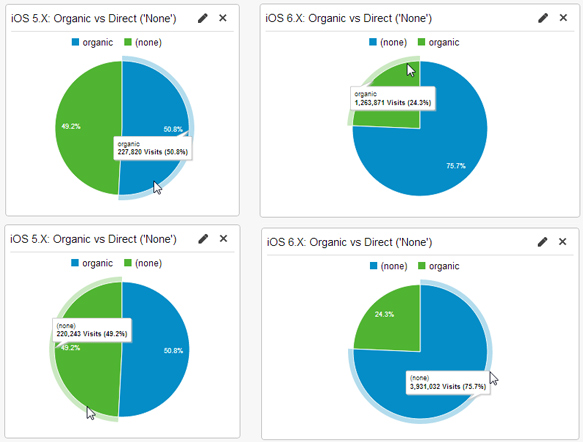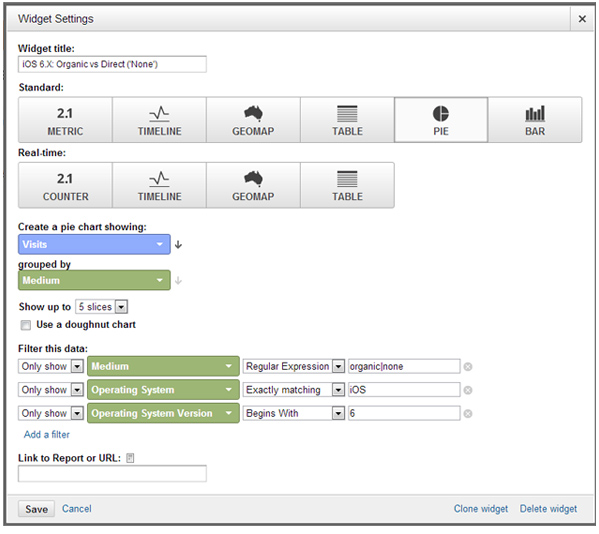There isn’t much left of this year. Companies that haven’t started planning their marketing strategy and budgeting for 2014 must begin soon.
When it comes to online marketing, most businesses rely excessively upon Web analytics to decide what was (or wasn’t) effective. What they find affects future decisions about where to invest time and money. Even radical decisions like firing internal staff, replacing an SEO consultant/agency, or doing away with SEO altogether are made on the basis of data thrown up by their stats package.
SEO consultants like ourselves need to report results and prove the ROI we can generate for our clients. We are evaluated on certain KPIs (key performance indicators) — often organic traffic growth or sales conversions from organic search traffic. But if (like many SEOs) you measure your impact by navigating to “Traffic Sources – Sources – Search – Organic†in Google Analytics, then I’ve got some news for you: You’re doing it wrong!
Why? Because those data don’t tell the whole story. Like crevasses on a glacier camouflaged under snow drifts, there are dangerous holes in your analytics data. If you’re not aware of them, you could fall into one — and make incorrect or ineffective decisions as a result!
- You may shut down highly effective tactics
- You may invest money, time and resources into less effective strategies
- You may slow down growth rate by taking a more arduous route
That’s why it is critical for everyone involved in your business — especially marketing staff, business planners and financial decision makers — to understand these 6 SEO challenges for 2014.
Challenge #1: Google Your Market Are Not Static
Most of my clients want to gain market share, traffic and results. They forget about first having to defend last year’s results and traffic!
You don’t “own†your ranking on search engines or the traffic that comes from it. Everything is fluid and dynamically changing. Other businesses (i.e., your competition) are constantly trying to steal your traffic, sales, and market share.
All the while, you must cope with the ever-changing environment — evolving technologies, Google’s shifting algorithms, behavioral changes in your market, new apps and devices, etc.
If your website ranked well and pulled in a flood of organic traffic last year (or earlier this year), that doesn’t automatically mean that this happy state of affairs will continue into next year. Without a plan to defend past results and a strategy to fight night and day against fresh competition, you can’t expect to continue seeing upward trends in Google Analytics — or profit curves that move in a positive direction.
The message is clear:
- Allocate money and resources in your 2014 budget to defend your visibility, traffic, conversions and sales.
- Competition is stiff and getting fiercer day by day.
- Companies without a defensive strategy could lose — and maybe even go bankrupt.
- “Business as usual†is a losing approach. Foresight and good judgment are critical.
- SEO isn’t “click and install.†You can’t leave it “as is.†It’s a continuous process.
- SEO strategies are in constant flux. Last year’s methods may not work. Your techniques might need fine-tuning or even a total makeover.
Challenge #2: You Can’t Get The Whole Picture Without Digging
When it comes to analytics data, what you see isn’t always what you get.
For instance, consider the iOS referrer issue that has plagued the SEO community for almost a year:
A change in iOS 6 made by Apple and not anticipated by Google means that […] those reaching websites from Google’s search engine after doing searches from within Safari will be counted as “direct†traffic rather than “search†traffic.
Depending on how much mobile traffic your site gets, this issue could mean that a sizable chunk of your organic search traffic isn’t even visible.
While the iOS issue was recently resolved (to some extent, at least), the fix isn’t perfect — nor is it retroactive. Thus, when analysts review the entire year’s data, there will still be discrepancies which cannot be reconciled easily. If they aren’t aware of the issue, it might appear as if SEO efforts are no longer effective.
If your SEO success is being measured using traffic data from your Web analytics platform, this misrepresentation of organic traffic might be costly and risky. That’s why, as search marketers, we must keep our finger on the pulse of change and account for such variables when analyzing data and creating reports.
The solution?
Establish a dashboard in your analytics tool where you calculate/estimate trends and statistics to see how much traffic is expected from organic search. Though not bulletproof, an experienced analyst can help you get pretty close to perfection.

Quantifying the impact for one of my clients.

Tip: Check how much the ‘iOS 6 Search vs. Direct’ issue affects your site with this free Google Analytics dashboard.
Challenge #3: You’re Being Blindfolded
Just under two years ago, Google began encrypting searches for logged-in users, preventing publishers from seeing keyword referral data for these users’ searches in Google Analytics (and other Web analytics platforms). While Google initially predicted that the “blacked out†search term data would represent a single-digit percentage of keyword referral data, some sites have seen â€more than 50% of terms being withheld, in some cases.â€
You can’t see when your eyes are blindfolded. When search users are logged into Google, you can’t see what keywords they used to find your business. On Google Analytics, this mass of data is displayed under the label, “not provided.â€

What can you do about this?
Well, not much really. Just be aware of it, and accept that it’s harder now to tell which keywords (generic or brand-specific) brought search traffic to your site.
Challenge #4: Frequent Changes On The SERPs
Search engine results pages (SERPs) have changed a lot. Google is aggressively promoting vertical/universal search, placing its own products above organic search results which are pushed further down. For some of my clients, even a #3 ranking for high volume keywords has led to a disastrous drop in organic search traffic. That’s because:
- On a 1024×768 pixel screen, a user must scroll to see their listings.
- Clients have to compete against many more sites.
- There are many more elements clamoring for attention and clicks.
So, if your organic traffic growth is flat, what to do?
- Don’t blame yourself. Don’t fire your SEO. Don’t even reduce spending.
- Even if you’ve had relatively little growth this year, you’ve not failed. Just retaining traffic amidst all these changes is an admirable achievement. You’re doing something right. Find out what that is and keep doing it.
- Be realistic in your expectations. It’s harder than ever before to predict the future!
Challenge #5: Traditional SEO Is Barely Enough
SERPs are not static. In fact, they vary by user location. Mobile search is exploding. Google knows where your users are when they search, and presents them with locally relevant suggestions.
When you search for hotels when you’re in Oslo, you’ll be presented with a list of local Norwegian hotels. If you’re not ranking high enough on those SERPs, your competitor will get the sale.
Social signals are also being thrown into the mix. What other customers are saying about you and your business is given more weight than other on-page SEO elements. Client reviews are more important than ever before.
Coping with this new reality is important in your SEO efforts.
- In 2014, your search strategy should be geo-targeted and multi-pronged. You need an international SEO strategy, a national SEO strategy, and a local SEO strategy.
- Get your business listed for the right local search terms. Here are some local ranking factors (yes, there’s more to it than titles and meta tags).
- Invite customer testimonials. Display social proof to attract ready-to-buy clients on the move.
Challenge #6: Quick Fixes Can Get You In Trouble
“Band-aid†SEO tactics are not only becoming less effective, they’re also getting downright dangerous. You could even get banned from Google for trying them! Only try quick fixes at your own risk. It’s far safer and more effective to follow SEO best practices to win over the long term.
As you’ve seen, there are challenges galore in SEO for 2014. That’s why it is so essential that you find out whether you are looking at the right data before planning and budgeting for the coming year. Unless you are aware of these pitfalls, and remain diligent in digging deep into your data, there’s a good chance that you won’t see all that you need to make a qualified and correct decision.
If you have any tips or suggestions to do this better, or if you have dealt with similar issues in your own business or consulting work, please share your experiences.
- How did you dig deeper into your analytics data?
- What did it reveal?
- How much extra organic traffic could you trace?
Let’s talk about it. Go on and leave a comment below.
Opinions expressed in the article are those of the guest author and not necessarily Search Engine Land.
Related Topics: All Things SEO Column | Channel: SEO | Google: Analytics | SEO: General
Article source: http://searchengineland.com/6-challenges-every-business-owner-marketer-must-know-about-seo-in-2014-170386
